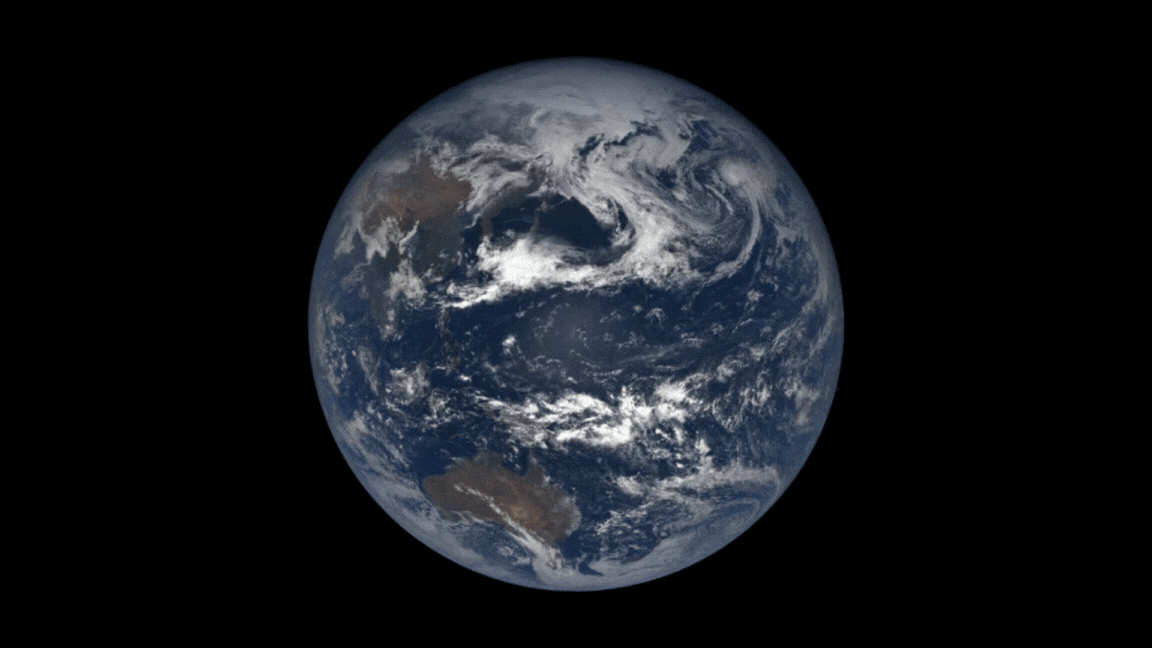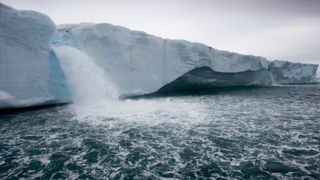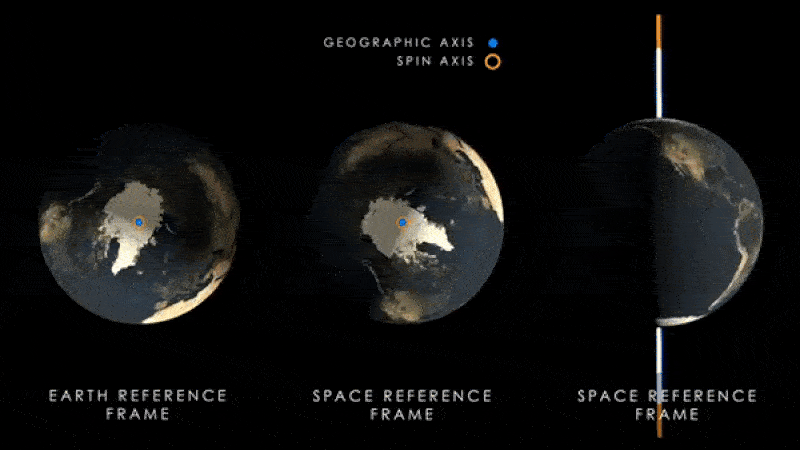Earth is wobbling and days are getting longer — and humans are to blame
New studies, which utilized AI to monitor the effects of climate change on Earth's spin, have shown that our days are getting increasingly longer and that our planet will get more wobbly in the future. These changes could have major implications for humanity's future.

The length of Earth's days and the orientation of our planet are being thrown out of balance as human-caused climate change continuously alters Earth's spin, new research suggests.
Initially, these changes will be imperceptible to us, but they could have serious knock-on effects, including forcing us to introduce negative leap seconds, interfering with space travel and altering our planet's inner core, researchers warn.
A day on Earth lasts about 86,400 seconds. But the exact time it takes our planet to complete a single rotation can shift by tiny fractions of milliseconds every year due to a number of factors, such as tectonic plate movements, changes to the inner core's rotation and gravitational tugging from the moon.
However, human-caused climate change is another factor that can alter the length of our days, and scientists are just starting to realize how much this will affect our planet's spin in the coming years.
Over the past few decades, the rate of ice loss from Earth's polar regions, particularly Greenland and Antarctica, has been increasing rapidly due to global warming, leading to rising sea levels. Most of this extra water accumulates near the equator, causing our planet to bulge slightly around the middle. This, in turn, slows the planet's spin because more weight is distributed farther away from the planet's center — similar to how spinning figure skaters slow down by moving their arms away from their bodies.
In the new study, published July 15 in the journal PNAS, researchers used an advanced artificial intelligence program that combines real-world data with the laws of physics to predict how the planet's spin will change over time.
Related: Everything you need to know about planet Earth
Get the Space.com Newsletter
Breaking space news, the latest updates on rocket launches, skywatching events and more!

The results back up a similar study published in March, which suggested that Earth's days will get longer in the future. However, the new program offered much more precise estimates of how days will lengthen over time.
The same research team behind the new paper also released another study, published July 12 in the journal Nature Geoscience, which showed that the increased water near the equator is moving Earth's axis of rotation. This is making the magnetic poles wobble farther away from the axis every year.
Scientists previously found that this effect has likely been happening for at least the past three decades. However, the new study suggests the axis will move even farther from its current position than previous studies predicted.
"We humans have a greater impact on our planet than we realise," Benedikt Soja, a geodesist at ETH Zurich in Switzerland who was a co-author on both the new studies, said in a statement. "And this naturally places great responsibility on us for the future of our planet."

Spinning slower
Earth's days have always varied in length. Around 1 billion years ago, our planet likely took only 19 hours to complete a single rotation, before slowing to the 24 hours we experience today.
It also changes on shorter timescales. For example, in 2020, Earth was spinning more quickly than at any point since records began in 1960. In 2021, the planet's rotation began to slow down again even though we experienced the shortest-ever recorded day in June 2022.
But in general, Earth's rotation has been slowing for millennia, mainly due to a process known as lunar tidal friction, in which the moon's gravitational effect on our oceans pulls water away from the poles. At the moment, this effect is lengthening our days by around 2.3 milliseconds every century.
The new studies show that climate change is currently lengthening our days by around 1.3 milliseconds every century. However, based on current global temperature models, the researchers predict that this could increase to 2.6 milliseconds per century by the end of the 21st century, which would make climate change the biggest influence on our planet's spin.
Potential impacts

One of the most likely effects of longer days would be the need to introduce negative leap seconds — where we'd occasionally lose a second from some future days to accommodate the lengthening days, similar to how leap years work.
The March study suggests that this may need to start happening as soon as 2029, mainly to accommodate for how much the days have already lengthened over the past few millennia.
In the past, scientists have suggested this introduction could mess with the timekeeping of computers and smartphones. However, not everyone is convinced this will be a major issue.
The researchers of the new studies also noted that future changes could impact space travel.
"Even if the Earth's rotation is changing only slowly, this effect has to be taken into account when navigating in space — for example, when sending a space probe to land on another planet," Soja said. It is therefore important to monitor these changes closely, he added.
The team also warned that the changes to Earth's rotational axis could alter the rotation of Earth's inner core, which could further increase how fast days lengthen. However, this potential interaction is still largely unknown.
Join our Space Forums to keep talking space on the latest missions, night sky and more! And if you have a news tip, correction or comment, let us know at: community@space.com.

Harry is a U.K.-based staff writer at Live Science. He studied Marine Biology at the University of Exeter (Penryn campus) and after graduating started his own blog site "Marine Madness," which he continues to run with other ocean enthusiasts. He is also interested in evolution, climate change, robots, space exploration, environmental conservation and anything that's been fossilized. When not at work he can be found watching sci-fi films, playing old Pokemon games or running (probably slower than he'd like).
-
Betamax_man Here we go again, blame humans with that old chestnut 'climate change'. It's getting rather boring now.Reply
There's only one thing that the climate myth does, and that's increase the cost of living for ordinary folk. -
COLGeek Reply
I respectfully disagree. There is no doubt that human activity exacerbates natural climate cycles. The science is conclusive on this fact.Betamax_man said:Here we go again, blame humans with that old chestnut 'climate change'. It's getting rather boring now.
There's only one thing that the climate myth does, and that's increase the cost of living for ordinary folk.
The evidence is literally all around us and cannot be ignored. Else, it will be at the peril of future generations.
What is wrong with being responsible stewards of our environment? Don't get me wrong, making a buck is fine, but if we can't breath the air, drink the water, grow our food, what is the point of that dollar? -
Betamax_man Reply
Well we're going to have to agree to disagree. The computer models are flawed. Yes the earth is warming, but has been a lot warmer than it is now. The obsession of CO2 is unbelievable. Without CO2, life dies, full stop. In the reign of the dinosaur, CO2 was much higher than it is now. Did humans create that? Of course they didn't. It's just another way to extract cash from the masses so the rich have more control. Wake up.COLGeek said:I respectfully disagree. There is no doubt that human activity exacerbates natural climate cycles. The science is conclusive on this fact.
The evidence is literally all around us and cannot be ignored. Else, it will be at the peril of future generations.
What is wrong with being responsible stewards of our environment? Don't get me wrong, making a buck is fine, but if we can't breath the air, drink the water, grow our food, what is the point of that dollar? -
COLGeek Reply
Emissions are certainly more than CO2. Regardless, our disagreement stands and that is okay.Betamax_man said:Well we're going to have to agree to disagree. The computer models are flawed. Yes the earth is warming, but has been a lot warmer than it is now. The obsession of CO2 is unbelievable. Without CO2, life dies, full stop. In the reign of the dinosaur, CO2 was much higher than it is now. Did humans create that? Of course they didn't. It's just another way to extract cash from the masses so the rich have more control. Wake up. -
Helio I can’t imagine how these milliseconds per century changes will have any important relative impacts compared to other changes.Reply
It’s important to note that Space.com articles make an effort to be intellectually honest. To note that 2022 was the shortest day on record is an example of this.
When “climate change” is argued I always try to separate people’s arguments of “kind” from “degree”. There’s no question that the climate has been warming, ever since the ice age, Further, the human increase to greenhouse gases, like CO2, will only enhance the temp. rise, unless, somehow, Earth can counter it. The greening of the planet, for example, isn’t enough to offset the temp. rise effects from CO2 increases, however.
But the question remains as to how much CO2, and other gasses, will raise the temperature independent of all the other many variables, including solar flux ( which varies ~ 10% in the UV), volcanoes, oceanic meridonal flows, etc.
Ultimately, climate models will reveal the actual sensitivity of our climate to a host of changes for all the important variables.
I encourage folks to read “Climate Uncertainty and Risk”, Judith Curry. -
Unclear Engineer Considering that the Earth has had both more and less ice, more CO2 in the atmosphere and less, more oxygen in the atmosphere and less, generally slowing rotation ever since the Moon was created, higher and lower mean temperatures, etc. etc. etc., these articles that seem to imply that everything would be constant if it wasn't for humans tend to disgust me.Reply
What I want to see is what effects the changes are projected to have on me and the rest of the species on the planet, how soon and how much.
We are committed to most of the changes that will occur over the next 50 to 100 years whether or not we change our ways soon, because the effects are largely coming from emissions that we have already released - and some natural changes along with them.
Whether or not the Earth's climate is "self-correcting" to the extent that we could still have another ice age is not established. So, it is not something that we should be betting on for our own well being. Even if it is self-correcting, and the ocean and atmospheric circulations change to cause another northern hemisphere ice age, we are all still in for a lot of warming first, in the terms of an individual human lifetime. And, another ice age would also be a tremendous impact on human infrastructures and populations.
We need to just recognize that our environment does change, and will change, and we need to deal with it as it happens. We don't really understand how to control Earth's climate so as to keep it constantly the same as it has been for the last 100 years. In fact, the last 100 years is not "typical" or "average" for the conditions over the previous 3 million or so years, anyway. And, before that, what was typical was also different from what became typical.
So, can we please have articles that do their best to explain the science that we think we can understand, and make room for that by deleting the guilt-trip innuendo? " - and humans are to blame" in a title is a clear tipoff that the article is click-bait for a political agenda. Days would still be averaging longer and the axis still would be wobbling if humans never existed.
I have been suggesting that climate modelers use those effects in their long-term climate models to see if they would provide better agreement between the models and geological evidence of past climates, because they do affect the Milankovitch cycle periods. -
trailrider Reply
Has anybody found the thermostat for that big ball in the sky? The sun is nearing its solar maximum (if it hasn't reached it already), and it has been throwing out an interesting assortment of flares and carrona mass ejections. There are other solar cycles besides the 11 year one. Think that might have anything to do with global warming.COLGeek said:Emissions are certainly more than CO2. Regardless, our disagreement stands and that is okay.
If CO2 is a big culprit, how about getting China and India to cut back on their use of coal. For an energy source, how about Solar Powered Satellites, and fission and fusion reactors?
If anyone is so hard over on what humans are doing to Earth, think about getting in touch with SpaceX and booking a ride to Mars aboard a Starship, when they become operational? -
Ken Fabian ReplyUnclear Engineer said:these articles that seem to imply that everything would be constant if it wasn't for humans tend to disgust me.
I find that attitude a bit dismaying, more so from you than other commenters, whom I don't expect to be informed or well reasoned.
The holocene had exceptional climate stability unprecedented in over more than 100,000 years until humans changed things -
Also it isn't a case of current global warming returning the world from a cold period back to a previous, more conducive warmer state - this change takes us from a higher than before global average temperature with unusual stabilty into uncharted territory. It hasn't been entirely stable during the Holocene either yet civilizations have risen and fallen from much less climate variablity in that period. People treating the destabilization of global climate, upon which agricultural production depends, as a crisis is not them being hysterical or alarmist. -
Unclear Engineer Ken,Reply
I criticized an article which states "Earth is wobbling and days are getting longer — and humans are to blame". Your statements about "climate stability in the Holocene" are not relevant to the criticism. There was far more ice melting between 25,000 years ago and 15,000 years ago than there has been in the last 10.000 years. So, wobble effects, day length effects, etc. are not "unprecedented" at the levels we are seeing now. And, even what we are seeing now is not all due to human actions. (And, your graph really needs to go back about 3 million years - it doesn't even go back to the previous warm period - so there really isn't a comparison between "natural" and "human influenced" in it.)
What I criticized is the article writers' attempt at propaganda that is easily discredited. That just provides evidence for others who do not want to believe that humans have caused any of the changes we see actually happening. That is why I am saying that writing stuff like that is backfiring if the intent is to make people worry about climate change.
I also think that article writers who talk about "stopping" sea level rise are undermining their own efforts. They talk about effects that are too near-term for us to actually stop.
What I think we really need is some specifics about what near term changes are going to be, and how soon and how bad. If they can predict that, they will gain some credibility among the skeptics and nay-sayers.
I am personally dealing with sea level rise issues on property that I own and a nearby historic town. We are planning for it and executing the plans, rather than telling everybody to "save us" by changing their ways. We know that (1) the changes that will cause us severe damage will occur, no matter what the world's human population does now, and (2), the same flooding has happened several times before in the last few million years, anyway. The real issue for us is how fast it will be occurring.
Similar concepts would be useful for other climate change issues. Where will it get hotter, wetter, drier, etc, and how much and how fast. Those are harder to predict than sea level, because they are not averaged over the whole globe. Some places will get more habitable, and some less habitable.
Our real problem is our current population density. When such major changes happened before, humans were hunter-gatherers, not farmers and industrialists. We can't move around as easily as our long-ago ancestors could. Yes, we have the technology to move farther and faster, but we don't have any relatively uninhabited areas to move into, now. Large scale migration will cause wars.
Frankly, with the population density we have now, even another ice age would cause similar problems at the global level - people would need to move in massive numbers for that, too.
We even have problems with depletion of resources if the climate does not change at all. For instance, a lot of industrial scale farming that "feeds the world" with exports is drawing down groundwater supplies and is not indefinitely sustainable. And, as Jan Steinman keeps posting, we really don't have an inexhaustible supply fossil fuels, either.
Humans are clearly going to have to change to adapt. I am sorry to say that I don't see us doing so collectively in an intelligent manner. And, I expect the unintelligent manner will involve a major population crash with a lot of agony.
But, that doesn't mean we should all just give up and not try to be intelligent and get others to behave intelligently.
And, to be intelligent about the realities of our situation, I strongly suggest that the people who purport to inform us about science stop with the "click bait" titles and unrealistic slants to their articles. -
Betamax_man Reply
Have you noticed, climate alarmists cherry-pick the data to fit their agenda?Unclear Engineer said:Ken,
I criticized an article which states "Earth is wobbling and days are getting longer — and humans are to blame". Your statements about "climate stability in the Holocene" are not relevant to the criticism. There was far more ice melting between 25,000 years ago and 15,000 years ago than there has been in the last 10.000 years. So, wobble effects, day length effects, etc. are not "unprecedented" at the levels we are seeing now. And, even what we are seeing now is not all due to human actions. (And, your graph really needs to go back about 3 million years - it doesn't even go back to the previous warm period - so there really isn't a comparison between "natural" and "human influenced" in it.)
What I criticized is the article writers' attempt at propaganda that is easily discredited. That just provides evidence for others who do not want to believe that humans have caused any of the changes we see actually happening. That is why I am saying that writing stuff like that is backfiring if the intent is to make people worry about climate change.
I also think that article writers who talk about "stopping" sea level rise are undermining their own efforts. They talk about effects that are too near-term for us to actually stop.
What I think we really need is some specifics about what near term changes are going to be, and how soon and how bad. If they can predict that, they will gain some credibility among the skeptics and nay-sayers.
I am personally dealing with sea level rise issues on property that I own and a nearby historic town. We are planning for it and executing the plans, rather than telling everybody to "save us" by changing their ways. We know that (1) the changes that will cause us severe damage will occur, no matter what the world's human population does now, and (2), the same flooding has happened several times before in the last few million years, anyway. The real issue for us is how fast it will be occurring.
Similar concepts would be useful for other climate change issues. Where will it get hotter, wetter, drier, etc, and how much and how fast. Those are harder to predict than sea level, because they are not averaged over the whole globe. Some places will get more habitable, and some less habitable.
Our real problem is our current population density. When such major changes happened before, humans were hunter-gatherers, not farmers and industrialists. We can't move around as easily as our long-ago ancestors could. Yes, we have the technology to move farther and faster, but we don't have any relatively uninhabited areas to move into, now. Large scale migration will cause wars.
Frankly, with the population density we have now, even another ice age would cause similar problems at the global level - people would need to move in massive numbers for that, too.
We even have problems with depletion of resources if the climate does not change at all. For instance, a lot of industrial scale farming that "feeds the world" with exports is drawing down groundwater supplies and is not indefinitely sustainable. And, as Jan Steinman keeps posting, we really don't have an inexhaustible supply fossil fuels, either.
Humans are clearly going to have to change to adapt. I am sorry to say that I don't see us doing so collectively in an intelligent manner. And, I expect the unintelligent manner will involve a major population crash with a lot of agony.
But, that doesn't mean we should all just give up and not try to be intelligent and get others to behave intelligently.
And, to be intelligent about the realities of our situation, I strongly suggest that the people who purport to inform us about science stop with the "click bait" titles and unrealistic slants to their articles.
